OPINION:
“Juche” — the ideology of North Korea — compels unquestioned obedience to the “supreme leader,” who is exalted as the greatest source of political thought. It is enforced by fear and murder even among the elite and accounts for the Kim regime’s paranoia and belligerence.
Because Kim Jong-un and his generals are the most fervent believers in it, juche drives their regime to develop nuclear weapons and ballistic missiles to threaten the United States and its allies. North Korea’s ideology is undisturbed by international sanctions.
But the Kim regime’s total immersion in juche has consequences. One direct consequence is the crisis President Trump is facing, which results from juche-propelled threats made serious by Mr. Kim’s ability to deliver on them.
North Korea chose to launch a ballistic missile on July 4, an American holiday, to demonstrate its contempt for America. That missile had the capability of reaching parts of the United States. It launched another on July 30, which had an even longer estimated range.
Intelligence estimates say that the Kim regime has developed nuclear weapons small enough to fit atop one of its ballistic missiles. Though it’s unclear whether they have developed re-entry vehicles capable of delivering a nuclear attack on America, they will soon if they haven’t already.
Now the Kim regime has directly threatened Guam with the launch of missiles that would intentionally miss it by a few miles creating a “ring of fire” around the island.
Guam is the home to about 160,000 people. Those born on the island are U.S. citizens. Andersen Air Force Base, and a nearby naval base, take up a considerable portion of the island. American strategic weapons, including recently arrived B-1 nuclear-capable bombers, are based there.
A North Korean launch at Guam would be an act of war. Because Guam is part of America, we would defend against it and respond to the attack as if it were an attack on Atlanta or Chicago.
The president rightly has taken a very tough tone. He has tweeted that a military solution to North Korea was locked and loaded. Defense Secretary James Mattis has warned the Kim regime that it could well be destroyed if it attacked us. The deterrent effect of these statements will be measured over the next few weeks. Mr. Kim values his life more than anything else, so the president’s and Mr. Mattis’ words might have the desired deterrent effect.
We are in a crisis akin to the Cuban Missile Crisis of 1962 with one important difference. Neither President John F. Kennedy nor Soviet Chairman Nikita Khrushchev wanted a nuclear war. Mr. Kim and his regime are different because of their ideology, recklessness and infatuation with nuclear weapons. It is both illogical and contrary to the facts to equate the threats of China’s or Russia’s nuclear weapons and missiles with the threat posed by North Korea’s.
If Mr. Kim chooses to launch missiles at Guam, several things would happen in rapid sequence. We, in Guam, and the Japanese in their nation, have Patriot and Terminal High Altitude Air Defense (THAAD) — anti-missile missile — batteries. Mr. Kim’s missiles would have to pass over Japan to reach Guam. The Japanese will try to shoot them down. Our THAAD batteries in Guam would certainly fire against the incoming missiles. This would begin an extraordinarily bloody war that North Korea would lose.
The North Koreans have perhaps 10,000 artillery pieces and missiles, dug in on their southern border aimed at Seoul, South Korea’s capital city. A large percentage of the 26 million people living in and around Seoul would probably die in the war’s first days.
We have no desire for such a war but will have to fight if attacked. But what if Mr. Kim decides not to shoot, at least at this point?
China, meaning to deter an American pre-emptive attack, has warned the United States that they would stay neutral if Mr. Kim fired the first shots but not, it implies, otherwise.
Any pre-emptive attack would be an enormous risk. Unless we knocked out both the Kim regime and its artillery and missiles on the border at the same time, pre-emption would fail.
President Trump has greatly confused matters by combining his tough-sounding tweets with a statement that he would consider negotiations with the Kim regime. Secretary of State Rex Tillerson has added to the confusion by saying that we don’t aim for regime change in North Korea.
Those who say there’s no easy solution to this crisis are correct, but such counsel is devoid of value. We have to recognize that North Korea isn’t going to be disarmed of its nuclear weapons and ICBMs peacefully.
By now it must be clear to all who aren’t willfully blind that China isn’t going to (and may not be able to) restrain Mr. Kim’s regime from continuing its aggressive behavior.
Mr. Trump should consult secretly with Chinese President Xi Jinping. He should make clear that we must impose regime change in North Korea and disarm it verifiably. He should offer to cooperate with China and make it clear that we don’t intend to use the situation to reunify the Koreas, which would be intolerable to the Chinese.
If Kim Jong-un and juche both die, there is a chance to disarm North Korea without millions of casualties. The only alternative is an horrific war.
• Jed Babbin served as a deputy undersecretary of defense in the George H.W. Bush administration. He is a senior fellow of the London Center for Policy Research and the author of five books including “In the Words of Our Enemies.”




Please read our comment policy before commenting.